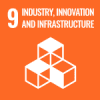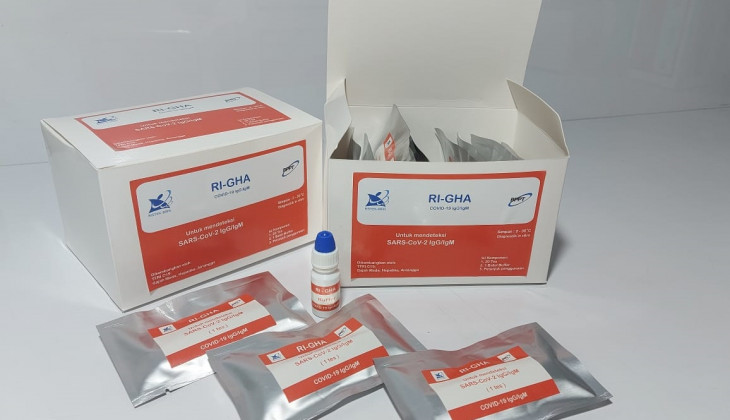Professor of the Faculty of Medicine, Public Health, and Nursing (FK-KMK) UGM, Prof. dr. Sofia Mubarika Haryana, M.Med.Sc., Ph.D., is leading the creation of an antibody-based rapid diagnostic test (RDT) for Covid-19 to detect IgM and IgG produced by the body to fight Covid-19 .
“Initially, when the Covid-19 pandemic emerged, we thought hard about what we could do to help handle Covid-19. Then the Agency for the Assessment and Application of Technology (BPPT) initiated a research innovation on Covid-19, “explained Prof. Rika, Friday (22/5).
BPPT invited and urged several Indonesian researchers to join in conducting research to tackle Covid-19. One of the invited researchers was Prof. Rika from FK-KMK UGM.
“Incidentally, my previous research was about a virus related to cancer, namely the Epstein-Barr Virus (EBV). I also studied immunology and molecular biology so I was willing to join, ” he said.
In its development, there are 6 areas of research innovation that are the focus of BPPT, one of which is the rapid diagnostic test. He himself has experience in making rapid diagnostic tests for Epstein-Barr Virus (EBV) in patients with nasopharyngeal cancer, and then chose to join forces to carry out an innovative rapid diagnostic test research by collaborating with other researchers, namely Prof. dr. Tri Wibawa, Ph.D., Sp.MK (K), a virologist and Professor of FK-KMK UGM, and Prof. dr. Mulyanto, a FK-KMK UGM alumni and researcher at the Mataram Hepatic Laboratory, West Nusa Tenggara.
The research group was also joined by Prof. Dr. drh. Fedik Abdul Rantam, Virologist, and Prof. Dr. dr. Cita Rosita Sigit Prakoeswa, Sp.KK (K)., Professor of Airlangga University, Surabaya. This rapid diagnostic test product is named RI-GHA which stands for the Republic of Indonesia – Gadjah Mada – Hepatika – Airlangga.
Prof. Mulyanto compiled a formula for the Covid-19 rapid diagnostic test, armed with his research experience in making rapid tests for hepatitis, which are now being used in Japan. The testing process uses a positive Covid-19 serum obtained from the Research and Development Agency.
“After the results are positive, then we also conduct a comparative test with commercial products. It turns out that the commercial product that is circulating is detecting total immunoglobulin, so it is not specific, and it is not like the total IgM or IgG that we have developed,” explained Rika regarding the process of developing this rapid diagnostic test.
The test results showed that of the 20 samples with positive IgM, RI-GHA products obtained 8 positives. Furthermore, compared to the best commercial brands, 8 results were also detected as positive.
“This means that of the 20 Covid-19 positive samples which was previously tested through PCR, 8 produced antibodies, it is possible the remaining samples have not formed antibodies yet,” he said.
With this initial comparison data, the team then carried out an online registration and a distribution permit process. According to him, of the total production of 10,000 tests, 4,000 tests will be submitted for validation tests to find out how high the accuracy is in the community.
The validation test was carried out by UGM at Dr. Sardjito, UGM Academic Hospital, Yogyakarta City Hospital, Dr. Kariadi Semarang, and Dr. Moewardi Solo, led by Prof. Tri Wibawa. In addition, the validation test was also carried out by Prof. Citra Rosita and Prof. Fedik and the team at Dr. Soetomo and UNAIR Hospital.
This Rapid Diagnostic Non-PCR test, explained Rika, apart from being used for screening, can also be used to monitor OTG, ODP, PDP, or post-infection. In addition to its low cost, this rapid diagnostic test has the advantage of being able to detect quickly, in 5-10 minutes, easy to use, practical, with high sensitivity and very specific. This Non-PCR Rapid Diagnostic test can be done anywhere, such as roads, schools, markets, stations, airports, and others.
“Hopefully the validity test results are good and the accuracy is high so that it can be used for massive screening in the community. The hope is that it can also be sent to remote areas, so that people can do it independently, by previously being trained on how to use it through national television,” he concluded.
Source: https://ugm.ac.id/id/berita/19458-ugm-pimpin-pembuatan-inovasi-rapid-test-covid-19-ri-gha



